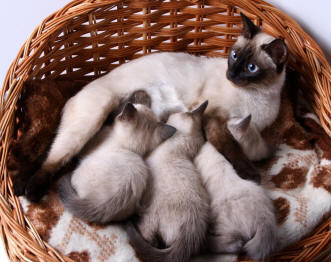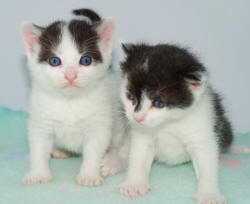Elimination
 Postnatal
is defined here as the first
month of life. This roughly
correlates with the period the
queen will stimulate
and consume urination and defecation.
By 2-3 weeks of age, kittens
are neurologically capable of
eliminating away from the nest.
This should be encouraged by
allowing access to an appropriate
area. This also reduces the
elimination load on the mother.
The Squatting Reflex
in male and female kitten begins
at about the same time.
Postnatal
is defined here as the first
month of life. This roughly
correlates with the period the
queen will stimulate
and consume urination and defecation.
By 2-3 weeks of age, kittens
are neurologically capable of
eliminating away from the nest.
This should be encouraged by
allowing access to an appropriate
area. This also reduces the
elimination load on the mother.
The Squatting Reflex
in male and female kitten begins
at about the same time.
| By
2-3 weeks of age, kittens are neurologically capable
of eliminating away from
the nest. |
 Body
Heat
Body
Heat
 Thermoregulatory
behavior is important since
hypothermia is one of the most
common causes of neonatal death.
For the first two weeks, puppies
are dependent on
their mother's body heat,
or the ability to sleep in a
heap and share heat. The ability
to regulate individual body
temperature begins at about
2 weeks of age, and is well
developed by 6 weeks of age.
During this period, the progress
can be assessed by observing
the tendency to sleep in groups,
gradually changing to sleeping
alone.
This
is the basis of the Rooting
Instinct in puppies.
This is the instinct in the
4 day old puppy to orient
toward, and push into any warm
object near its head. This will
usually get it near mom or a
heap of littermates, and a source
of heat. This rooting reflex
disappears as a reflex at about
4 months, but may be observed
in older dogs as "nudging"
for attention or affection.
Thermoregulatory
behavior is important since
hypothermia is one of the most
common causes of neonatal death.
For the first two weeks, puppies
are dependent on
their mother's body heat,
or the ability to sleep in a
heap and share heat. The ability
to regulate individual body
temperature begins at about
2 weeks of age, and is well
developed by 6 weeks of age.
During this period, the progress
can be assessed by observing
the tendency to sleep in groups,
gradually changing to sleeping
alone.
This
is the basis of the Rooting
Instinct in puppies.
This is the instinct in the
4 day old puppy to orient
toward, and push into any warm
object near its head. This will
usually get it near mom or a
heap of littermates, and a source
of heat. This rooting reflex
disappears as a reflex at about
4 months, but may be observed
in older dogs as "nudging"
for attention or affection.
 Sensory
Awareness
Sensory
Awareness
 At
birth the nervous system is
literally not fully "hooked
up" as evidenced that
the eyes and ears (the primary
sensors of the environment)
are not functional until about
two weeks of age. When they
do open, they are not fully
functional until about 3 months
of age.
At
birth the nervous system is
literally not fully "hooked
up" as evidenced that
the eyes and ears (the primary
sensors of the environment)
are not functional until about
two weeks of age. When they
do open, they are not fully
functional until about 3 months
of age.
The Startle
Reflex (freeze
after a new sound) gets plugged
in at about 20 days, and the
Orientation Reflex
based on visual and auditory
stimulus (turn toward a stimulus)
begins at about 25 days.
Socialization
 Because
the eyes and ears are closed
for the first two weeks of life,
there is relatively little opportunity
for specific learning, but gentle
handling stimulates balance,
adrenal function, and imprinting
on the smell of humans. The
classic socialization period
begins at about 3 weeks of age
and continues through about
19 weeks of age. This is the
perfect time to teach the
kitten everything.
Because
the eyes and ears are closed
for the first two weeks of life,
there is relatively little opportunity
for specific learning, but gentle
handling stimulates balance,
adrenal function, and imprinting
on the smell of humans. The
classic socialization period
begins at about 3 weeks of age
and continues through about
19 weeks of age. This is the
perfect time to teach the
kitten everything.
Gentling
is the key to
developing a people friendly
personality. Starting any time
after 2 weeks of age, it is
recommended that each kitten
be picked up and handled for
at least one minute per day.
Multiple short episodes is ideal.
The gentling should consist
of rotating the kitten in different
ways, and rubbing hands all
over the body. Talking to the
kitten during this time will
link gentle handling to the
human voice. The kittens must
be protected during this 3-10
week period since any negative
experience will also have a
magnified negative fear inducing
effect.
 All
behaviorists do not agree, but
it may help the development
of balance to push the kitten
gently when he has all four
feet on the ground so he responds
by trying to keep his balance.
It almost certainly increases
intelligence to provide play, toys,
and climbing obstacles for
kittens.
All
behaviorists do not agree, but
it may help the development
of balance to push the kitten
gently when he has all four
feet on the ground so he responds
by trying to keep his balance.
It almost certainly increases
intelligence to provide play, toys,
and climbing obstacles for
kittens.